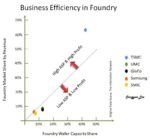Machine learning applications have become pervasive and increasingly complex, from recommendation agents in online interactions to personal assistants for command response to (ultimately) autonomous vehicle control. Yet, an often overlooked facet of machine learning technology is the deployment in industrial process… Read More
Extending Moore’s Law with 3D Heterogeneous Materials Integration
A great deal has been written of late about the demise of Moore’s Law. The increase in field-effect transistor density with successive process nodes has slowed from the 2X every 2 1/2 years pace of earlier generations. The economic nature of Moore’s comments 50 years ago has also been scrutinized – the reduction in cost per transistor… Read More
Is IBM’s 2nm Announcement Actually a 2nm Node?
IBM has announced the development of a 2nm process.
IBM Announcement
What was announced:
- “2nm”
- 50 billion transistors in a “thumbnail” sized area later disclosed to be 150mm2 = 333 million transistors per millimeter (MTx/mm2).
- 44nm Contacted Poly Pitch (CPP) with 12nm gate length.
- Gate All Around (GAA), there are several ways
You know you have a problem when 60 Minutes covers it!
-Chip shortage on 60 Minutes- Average Joe now aware of chip issue
-Intel sprinkling fairy dust (money) on New Mexico & Israel
-Give up on buy backs and dividends
-Could Uncle Sam give a handout to Intel?
You normally don’t want to answer the door if 60 Minutes TV crew is outside as it likely doesn’t mean good things.… Read More
Intel’s EMIB Packaging Technology – A Deep Dive
The evolution of low-cost heterogeneous multi-chip packaging (MCP) has led to significant system-level product innovations. Three classes of MCP offerings have emerged:
- wafer-level fan-out redistribution, using reconstituted wafer substrates of molding compound as the surface for interconnections between die (2D)
How to Spend $100 Billion Dollars in Three Years
TSMC recently announced plans to spend $100 billion dollars over three years on capital. For 2021 they announced $30B in total capital with 80% on advanced nodes (7nm and smaller), 10% on packaging and masks and 10% on “specialty”.
If we take a guess at the capital for each year, we can project something like $30B for 2021 (announced),… Read More
TSMC Ups CAPEX Again!
We were all pleasantly surprised when TSMC increased 2021 Capex to a record $28 billion. To me this validated the talk inside the ecosystem that Intel would be coming to TSMC at 3nm. We were again surprised when TSMC announced a $100B investment over the next three years which belittled Intel’s announcement that they would spend … Read More
Foundry Fantasy- Deja Vu or IDM 2?
– Intel announced 2 new fabs & New Foundry Services
– Not only do they want to catch TSMC they want to beat them
– It’s a very, very tall order for a company that hasn’t executed
– It will require more than a makeover to get to IDM 2.0
Intel not only wants to catch TSMC but beat them at their own … Read More
Intel Takes Another Shot at the Enticing Foundry Market
Intel made a big splash on March 23, 2021 by doubling down on manufacturing with the creation of Intel Foundry Services (IFS). The big announcement was supported by potential customers such as Qualcomm, Cisco, Ericsson, Google, Amazon, Microsoft, and IBM. With an accompanying $20B investment, the EDA and equipment industries,… Read More
Intel’s IDM 2.0
In January I presented at the ISS conference a comparison of Intel’s, Samsung’s and TSMC’s leading edge offerings. You can read a write-up of my presentation here.
With the problems going on at Intel, that article generated a lot of interest in the investment community, and I have been holding a lot of calls with analysts who are trying… Read More












The Name Changes but the Vision Remains the Same – ESD Alliance Through the Years